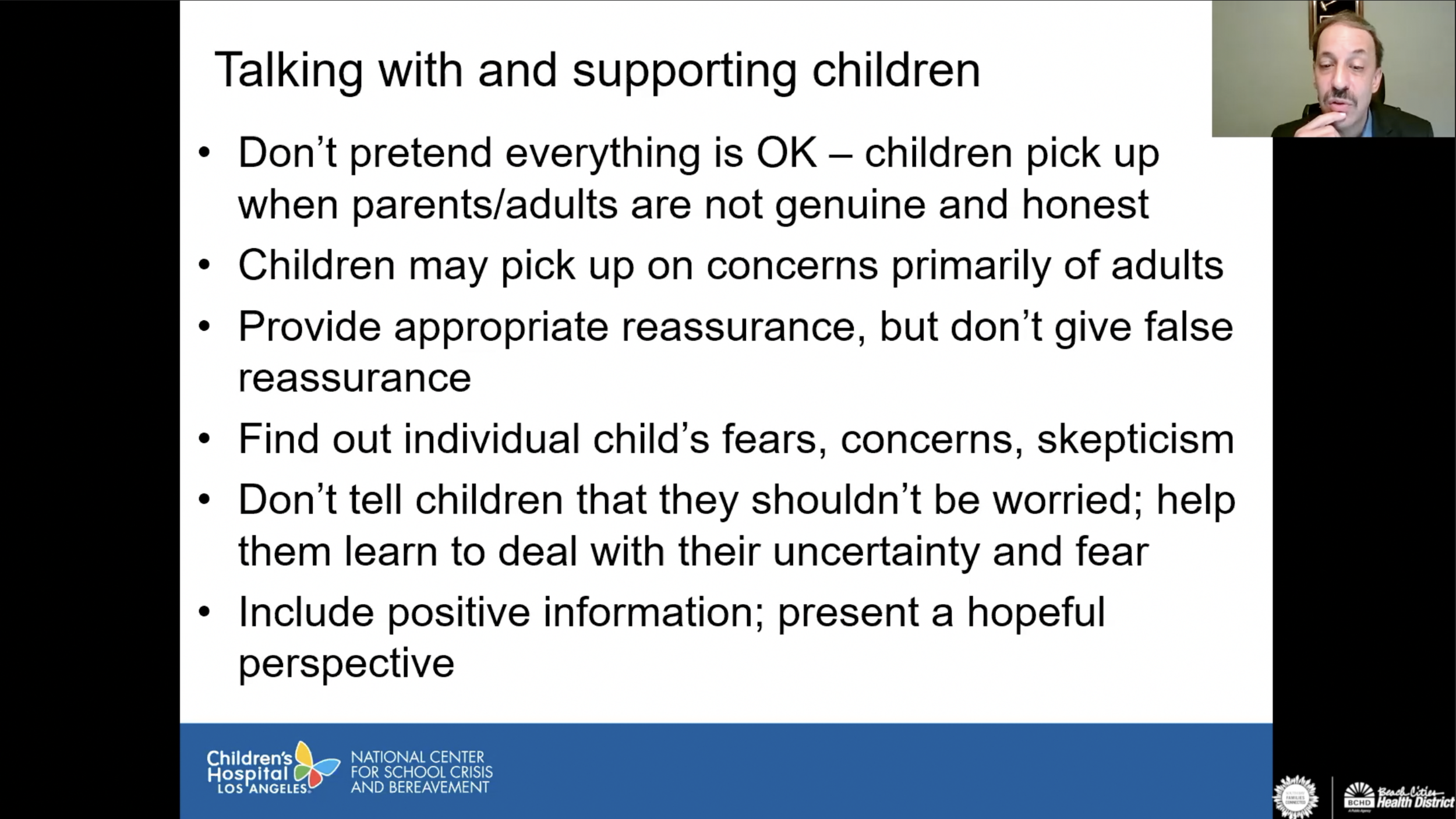Whether you are mourning the death of a loved one or grieving a traumatic world event, your feelings and those of your children are valid and important to acknowledge. Our hope is that the resources we have produced and gathered on this page will provide some support and guidance to help you process grief in the way that works best for you and your family. Know that you are not alone in your grief, and that resources and help are available to you. For instructions to view this page in Spanish, click on en Español.
Families Connected Resources
Featured videos: expert advice to help youth cope with grief
“How to Talk with Children About Traumatic Events”, with Dr. David Schonfeld.
“Supporting Someone in Distress - What to Say and Not to Say”
“Acknowledging Our Own Emotions and Reactions”
Grief insight from Leah Niehaus, LCSW
Tips for parents from Anna Pirkl, M.A., MFT, ATR, CAADAC
Tips for parents to keep in mind when their child is suffering loss
First and foremost, it is good for kids to express whatever emotions they are feeling.
Kids and young adults may react to grief very differently than adults and their process might not be what you would expect.
It is important to talk with your child directly about the loss. There are outstanding resources in the section below to help you guide those conversations in an age appropriate way.
When your child asks questions about a death, it’s usually a sign that they’re curious about something they don’t understand. As an adult, a couple of the most important things you can do for children is to let them know that all questions are okay to ask, and to answer questions truthfully
In addition to talking, activities can really help a grieving child express and process their feelings. There are many age appropriate activities to choose from in the resources featured below.
Do not ignore your own grief. Self care is so important when your family is grieving. Find good sources of support. Research shows us that how well a child does after a death is linked to how well the adults in his life are doing. Be prepared to accept help from friends, relatives and possibly mental health professionals.
Your children’s school will have resources and support for your child. Please check with your counseling department.
(Sources: based on information from The Dougy Center, Child Mind Institute, and Our House, all are featured in the resource section below)
Curated Gallery of Resources
Clicking on the logos, images and links below will take you out of the Families Connected website and to the online resource indicated. Families Connected is not affiliated with these organizations, nor have these organizations paid to have their resources shared here. Families Connected will remain open in your browser.
Recommended articles, guides and podcasts
After a Loved One Dies - How Children Grieve and How Parents Can Help Them (Coalition to Support Grieving Students, also in Spanish)
Helping Children Cope with Grief - an article and guide that offers age-specific insight (Child Mind Institute)
The Importance of Mourning Losses (Even When They Seem Small) (KQED)
What a Children’s Book Taught Me (And My Students) About Grief (Greater Good Magazine)
How Grief and Loss Affect Your Brain and Why it Takes Time to Adapt (NPR)
Podcast: Healing Your Heart (Hidden Brain)
National resources for schools and parents
The Coalition to Support Grieving Students provides a practitioner-oriented website which offers practical, accessible information for educators, principals, administrators and student support personnel to guide them in supporting and caring for their grieving students. We highly recommend their videos and downloadable modules. Though created for school personnel, this is an excellent resource for parents and caregivers as well. We recommend the video, What Not to Say to anyone interacting with a grieving child or young adult.
The NCSCB provides online downloadable resource guides for Talking with Children about Tragedies, Responding to the Death of a Student or School Staff, Responding to Suicide, Psychological First Aide: After a Natural Disaster, among other topics. They also offer an online resource center and support for schools.
We recommend reading Addressing Grief and Care for Caregivers, evidence-based guides published by NASP that offer straight forward facts and tips, as well as a list of additional national resources on the subject of grief.
How to talk with your kids about loss in age appropriate ways
This is an outstanding guide available online and a downloadable pdf from Child Mind Institute that provides insight into helping children cope with grief, including what to say and how to say it, advice for a traumatic death, and what to expect from kids ages 2-4, 4-7, 7-13, and 13-18. We also recommend their blog, Helping Children Deal with Grief.
Produced in partnership with PBS, this Sesame Street in Communities resource page entitled, Helping Kids Grieve provides parents tips for sharing and talking, finding comfort, and moving through the grief. This resource trends younger. On this page you will also find printable tools and a link to a resource page.
The Dougy Center offers a wide array of age appropriate tip sheets articles on grief. We recommend starting with How to Help a Grieving Child or How to Help a Grieving Teen for age appropriate guidance.
Our House Grief Support Center offers outstanding articles to guide parents during a loss in the family. We recommend reading Teen’s Natural Grief Response and Grief During the Tumultuous Teen Years.
Recommended videos
Related Families Connected Topics
More resources for parents and guardians
Resources for teens
For More Youth Wellness Resources, Visit:
For South Bay parents and caregivers
Go to South Bay Families Connected for educational events, the SBFC monthly parent e-newsletter, and more. For mental health referrals and support groups, go to Beach Cities Health District.
For parents and caregivers in the U.S.A.
Visit the Families Connected landing page for non-region-specific, free youth wellness online resources.















